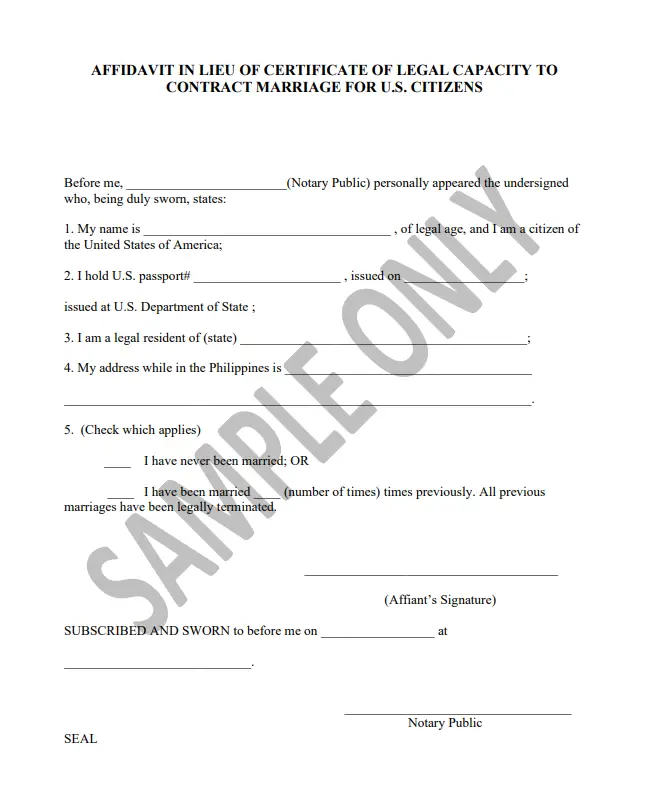How To Get Married in the Philippines With a Foreigner: An Ultimate Guide

Any person–local or foreigner–who has decided to get married in the Philippines must submit specific requirements. Learn the procedures and requirements needed to get married in the Philippines to a US citizen or any foreigner.
Table of Contents
How To Get Married in the Philippines with a US Citizen
In the case of U.S. citizens, a marriage license will not be issued unless you have already secured a Certificate of Legal Capacity to Contract Marriage.
According to the US Embassy in the Philippines 1, this document “affirms that there are no legal impediments to the foreigner marrying a Filipino.”
However, the U.S. Consular Officers are legally prohibited from making any official certification about your eligibility to marry someone in the Philippines. They can only provide an Affidavit In Lieu of Certificate of Legal Capacity to Marry.
An Affidavit In Lieu of Certificate of Legal Capacity to Marry contains the following:
- A sworn statement attesting that the foreigner is currently unmarried
- Information regarding the foreigner’s prior marriages
- Copy of evidence proving the US citizenship of the foreigner
You may refer here for a sample affidavit from the US Embassy.

Any local public notary can notarize this affidavit. It is not required to be notarized at the US Embassy or Consular Agency in the Philippines. Local notarization of this affidavit is allowed by the Philippine Statistics Authority (PSA) as stated in the issued Memorandum Circular No. 2021-0042.
In short, there’s no need to proceed to the US embassy or consular agency to get an Affidavit in Lieu of Certificate of Legal Capacity to Marry. Just print the affidavit template from the US Embassy, fill it out, and get it notarized by any public notary.
However, before the completion of the affidavit, you must first contact the Local Civil Registrar (LCR) of the area where you intend to get married3 so they can assist you with the information that must be written in the affidavit.
Once you have obtained the Affidavit in Lieu of a Certificate of Legal Capacity to Marry, you can apply for a marriage license at the local civil registrar of a city or municipality where either of you habitually resides.
After that, you and your partner can marry in a church or civil wedding.
How To Get an Affidavit in Lieu of a Certificate of Legal Capacity To Contract Marriage in the Philippines
A Certificate of Legal Capacity to Marry is one of the most critical requirements for Americans to get married. Unfortunately, the U.S. Embassy is unable to issue this type of certificate because the U.S. Consular Officers are prohibited from releasing certifications about an American citizen’s eligibility to marry.
However, they can issue an Affidavit in Lieu of a Certificate of Legal Capacity to Marry, which the Philippine government accepts as long as it’s obtained from the U.S. Embassy in Manila.
The Affidavit in Lieu of a Certificate of Legal Capacity to Marry is a self-certification to be executed by the American citizen at the U.S. Embassy in the Philippines, indicating that he’s free to marry in the Philippines.
As stated previously, under Memorandum No. 2021-0041 issued by the Philippine Statistics Authority (PSA), local notarization of “Affidavits in Lieu of Certificate to Legal Capacity to Contract Marriage” is now allowed. As of this writing, the US Embassy in Manila and Consular Agency in Cebu have stopped notarizing these affidavits. Hence, US nationals planning to get married in the Philippines may get their affidavit notarized by any local public notary.
Requirements
- U.S. Passport (must be valid)
- Divorce Decree (if the foreigner is divorced)
- Death Certificate of Spouse (if the foreigner is a widow/widower)
Step-by-Step Guide
- Proceed to the Local Civil Registry Office of the area where you intend to get married to verify the information included in the affidavit. You may consult an attorney if you have specific questions regarding the affidavit.
- Prepare a draft of the Affidavit in Lieu of Certificate of Capacity to Marry. You may use the template provided by the US Embassy.
- Write the following details in the affidavit:
- Name of the US citizen
- Passport number and issuance date
- State residency
- Local address in the Philippines
- Civil status
4. Print the affidavit and get it notarized by any local public notary.
How To Get Married in the Philippines with Other Foreigners
If you’re a Filipino planning to marry a foreigner, note that there are basic documentary requirements you need to obtain.
a. Certificate of Legal Capacity to Marry issued by the embassy here in the Philippines. Although it may vary depending on your foreign spouse’s country of origin, here are the following basic requirements for the Certificate of Legal Capacity to Marry:
- Certificate of No Impediment (CNI), to be issued after booking an appointment and taking an oath in the embassy.
- Original or certified true copy of the divorce decree or death certificate of the deceased spouse, if applicable.
- A Moral Character Reference, which takes the form of a letter or certificate from a person of authority, a social worker, health or education officer, or a church minister who has direct personal knowledge of the prospective foreign spouse’s character.
b. Passport (original and photocopy).
c. Latest Certificate of No Marriage (CENOMAR) or Certificate of Singleness (original and photocopy) issued by PSA.
d. If your foreign spouse is a former Filipino citizen (and a divorcee) or someone previously married to a Filipino, he/she must obtain Judicial Recognition of the absolute divorce decree from the country where the previous marriage was held.
Frequently Asked Questions
1. I’m a foreigner. How long can I stay in the Philippines if I am married to a Filipina?
To stay in the Philippines after marrying a Filipina, you must apply for a Residence Visa for the Spouse of a Filipino Citizen, also called the 13A Non-Quota Immigrant Visa.
This visa also applies to your unmarried child below 21 years of age. Upon getting the visa, you can stay in the country for one year, which can be extended for another 2-10 years. It must be noted that this visa type can only be issued to nationals of selected countries.
How To Apply for a Residence Visa if You’re Married to a Filipino Citizen
Requirements
a. Fully accomplished Visa Application Form (2 copies)
b. Original Passport of applicant (with at least six months validity)
c. Photocopy of Filipino spouse’s passport (2 copies)
d. Marriage certificate (original and photocopy) – This must be authenticated by the Philippine Department of Foreign Affairs (if the marriage took place in the Philippines) or registered with the Philippine Embassy of the country where the applicant and Filipino spouse got married (if the marriage took place in another country)
e. Applicant’s birth certificate (original and photocopy)
f. Filipino spouse’s birth certificate (original and photocopy)
g. Applicant’s proof of financial status (bank certificates, property deeds, certificates of stocks)
h. Applicant’s police clearance from the country of origin
i. Applicant’s passport-sized colored photo with white background (2 pieces)
j. Proof of marriage annulment (if the Filipino spouse’s previous marriage was annulled)
k. Secondary evidence of the applicant’s citizenship, identity, and admissibility to the Philippines
l. Applicant’s medical form/examination report (accomplished by a physician) and X-ray Result (soft copy) after taking a medical exam
m. 13A Visa application fee (starts at USD 150)
Step-by-Step Guide
a. Secure an application form from the Immigration Office, Philippine Embassy, or its official website.
b. Accomplish the application form and complete all the documentary requirements.
c. Have your documents assessed at the Central Receiving Unit of any Immigration Office or Philippine Embassy.
d. Get an Order of Payment slip and pay the required Visa application fee.
e. Check the official receipt for the venue and schedule of the hearing and Image and Fingerprint Capturing.
f. Attend the hearing.
g. Go to the Image and Fingerprint Capturing Counter and submit all the requirements.
h. Check the website from time to time for the status of your visa application.
i. Once approved, submit your passport for visa implementation.
2. Is it better to get married in the U.S. or Philippines?
It depends on your needs and your plans with your spouse.
It’s better to get married in the Philippines if you plan to stay there for good after marriage. The American citizen spouse can apply for a Residence Visa in the Philippines.
On the other hand, getting married in the US is the better option if you and your partner plan to reside there after the wedding.
Getting married in the Philippines will make the Filipino spouse’s US visa application process longer and more complicated. You’ll also spend some time away from each other during the process as the foreign spouse will be required to go back and stay in the U.S. so he can petition his/her spouse’s Immigrant Visa.
An American citizen must be currently residing in the U.S. to be able to execute an Affidavit of Support, which is one of the requirements for an immigrant visa petition. Once the petition is filed, you’ll have to wait 6-12 months for the visa.
By contrast, if you get married in the U.S. while on a K1 or the Fiancé /Fiancée Visa, the waiting time will only be 3-6 months. You’ll also live with your spouse while waiting for the visa. The downside, however, is your family and friends will be less likely to attend your wedding.
References
- Marriage. (2022, May 11). Retrieved October 4, 2022, from https://ph.usembassy.gov/marriage/
- Philippine Statistics Authority (PSA). (2021, March 21). Memorandum Circular No. 2021-04 [Press release]. Retrieved October 5, 2022, from https://psa.gov.ph/sites/default/files/MC%20NO.%202021-04%20Local%20or%20Philippine%20Notarization%20of%20Affidavits%20in%20lieu%20of%20Certificates%20of%20Legal%20Capacity%20to%20Contract%20Marriages.pdf
- Marriage. (2022, May 11). Retrieved October 4, 2022, from https://ph.usembassy.gov/marriage/
Copyright Notice
All materials contained on this site are protected by the Republic of the Philippines copyright law and may not be reproduced, distributed, transmitted, displayed, published, or broadcast without the prior written permission of filipiknow.net or in the case of third party materials, the owner of that content. You may not alter or remove any trademark, copyright, or other notice from copies of the content. Be warned that we have already reported and helped terminate several websites and YouTube channels for blatantly stealing our content. If you wish to use filipiknow.net content for commercial purposes, such as for content syndication, etc., please contact us at legal(at)filipiknow(dot)net
